Rethinking the Urban-Rural Relationship

By Jennifer Martin
This year (2019) the Institute for Ecological Civilization is in the first stage of a multi-year initiative to collaborate on some of the greatest threats facing modern civilization: rapid urbanization, climate change, and the social and economic problems these will create.
As rural migration to urban centers increases, the relationship between cities and rural communities must be re-evaluated. Sprawl from cities threatens former rural and agrarian areas, even as growing populations put a strain on existing food, water, transportation, and energy systems. Urban design, planning, and engineering must be reworked to accommodate the increased populations and need for decreased reliance on carbon-based energy. Collaboration across the different sectors of society is especially important for reconceiving relationships between urban centers and the surrounding rural areas. Projects that focus narrowly on a single part of the overall system pose the risk, indeed the likelihood, that solutions to problems in one sector will have unintended consequences in other sectors. EcoCiv, with its unique capabilities in cross-sectoral analysis and collaboration, is well-positioned to gather experts across fields and sectors, to examine what changes should be made and how to make them from a systemic and long-term perspective. Viewing rural and urban communities not as separate entities but as parts of interconnected systems – as bioregions – is a key step toward reversing this trend.
Over the next few months, we are connecting experts in ecological civilization and bioregionalism in exploratory online meetings, identifying essential sectors, leaders, and organizations and bringing them to the table to flesh out systemic and long-term solutions. These meetings will culminate this summer in San Diego at a convening that combines these experts with a small group of visionary consultants from the private and public sectors. This team will identify successful initiatives already being done that align with long-term and cross-sector thinking, and begin exploring new and promising options for restructuring cities.
The methods and ideas produced in San Diego will help direct the next stage of the project, a larger convening in Vermont this fall. The convening will provide a working case study in the bioregions of Vermont, giving attendees an opportunity to convert their knowledge into a set of concrete goals, collaborating with local experts in agriculture and education, as well as representatives in local government, civic organizations, NGO’s, and small business. The recommendations developed here will offer guidance as we bring the conversation about urban-rural relationships to other regions and communities in the United States and around the world.
Header Photo: Pixabay
